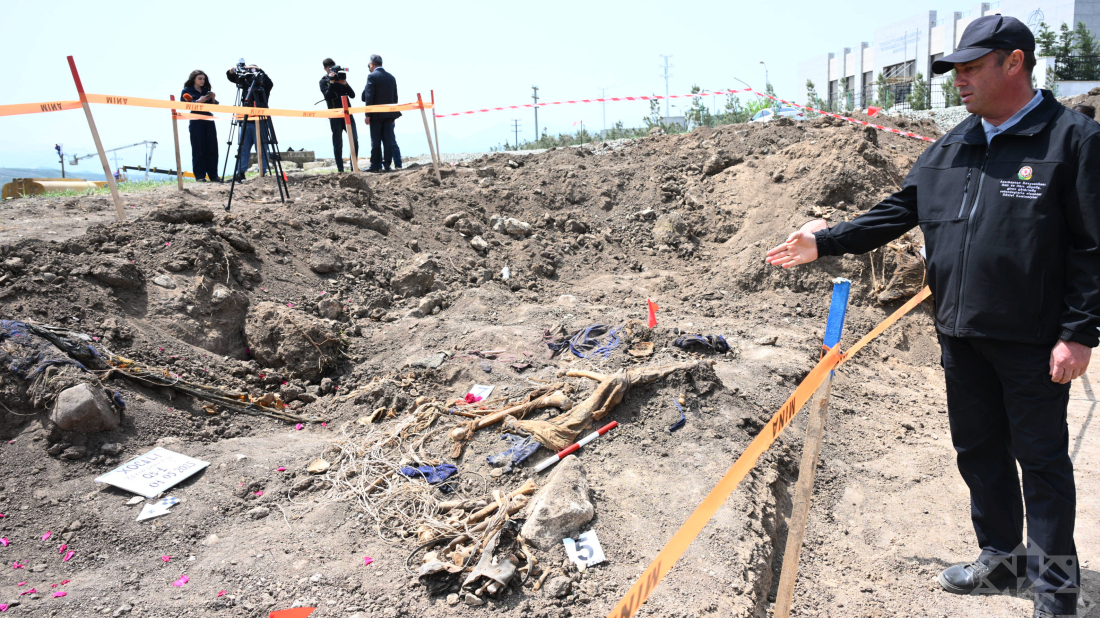British Steel wins multi-million-pound Türkiye high-speed rail contract
British Steel has secured a multi-million-pound order to supply rail for a major high-speed railway in Türkiye. Backed by UK Export Finance, the deal...

Two mass graves have recently been uncovered in Azerbaijan’s Karabakh region, believed to hold the remains of civilians who went missing during the First Karabakh War over 25 years ago. One grave was found near the city of Shusha, and the other along the Askeran-Khojaly road.
Standing at the site, Zeynab Farajzada of AnewZ reported from Khojaly, a district deeply scarred by the war. “Behind me, is a newly discovered mass grave, believed to date back more than 25 years,” she said, highlighting the grave’s connection to the conflict that ravaged the region.
Experts recently unearthed bone fragments believed to belong to at least seven individuals along the Askeran-Khojaly road. The remains were identified as those of civilians, who were reportedly tortured, bound, and buried. Experts from various state bodies confirmed that the remains belong to civilians who went missing during the First Karabakh War.
Eldar Samadov, Deputy Head of the Working Group of the State Commission on Prisoners of War, Hostages, and Missing Persons, spoke about the discovery, revealing that “a total of 3,990 people have been registered as missing as a result of Armenia's military aggression against Azerbaijan.” He added, "The mass grave we uncovered today is yet another piece of evidence of Armenia's crimes, and it refutes claims made by the Armenian side that a humanitarian corridor had been established for the civilian population of Khojaly."
The search for missing persons has shed light on the fates of 170 Azerbaijani citizens in recent years, but many remain unaccounted for.
Konul Behbudova, a representative of the Karabakh Missing Families Community, shared her personal loss and the pain of thousands of others. "I lost my brother in the First Karabakh War, and for 33 years, I have had no information about his fate," she said, representing nearly 4,000 families of the missing. Her words echoed the sorrow felt by many, as the search for answers continues.
Amir Aliyev, a member of the International Community of Human Rights, emphasized the importance of bringing those responsible for these atrocities to justice. “The cultural heritage here has been seriously damaged, almost looted,” Aliyev stated, referring to the widespread destruction in the region. "Bringing those responsible for such crimes to justice is a well-established principle in international law."
The mass graves serve as stark reminders of the war’s devastating human toll. The First Karabakh War, fought between Azerbaijan and Armenia from 1988 to 1994, saw the Armenian military occupy Karabakh, a region internationally recognized as part of Azerbaijan, and seven surrounding districts, including Khojaly.
In Khojaly, one of the war's most horrific episodes occurred during a two-hour Armenian offensive that led to the massacre of 613 Azerbaijani civilians, including 106 women, 63 children, and 70 elderly people. The massacre, which also left 487 others seriously injured, is known as the Khojaly Genocide. To date, around 150 of the 1,275 Azerbaijani civilians captured during the genocide remain missing, with entire families wiped out.
The second mass grave, located near Shusha at the intersection of the Shusha-Khankandi and Shusha-Lachin roads, contained at least five sets of remains. The discovery further highlights the ongoing efforts to uncover the war’s hidden human cost and seek justice for the victims of these historical atrocities.
Cuba’s fuel crisis has turned into a waste crisis, with rubbish piling up on most street corners in Havana as many collection trucks lack enough petrol to operate.
Ruben Vardanyan has been sentenced to 20 years in prison by the Baku Military Court after being found guilty of a series of offences including war crimes, terrorism and crimes against humanity.
Canadian Prime Minister, Mark Carney, announced on 16 February that the Honourable Janice Charette has been appointed as the next Chief Trade Negotiator to the United States. She's been tasked with overseeing the upcoming review of the Canada-United States-Mexico Agreement (CUSMA).
The Pentagon has threatened to designate artificial intelligence firm Anthropic as a “supply chain risk” amid a dispute over the military use of its Claude AI model, according to a report published Monday.
Israeli airstrikes on southern Lebanon killed two people in 12 hours, Lebanon’s Health Ministry said on Tuesday.
British Steel has secured a multi-million-pound order to supply rail for a major high-speed railway in Türkiye. Backed by UK Export Finance, the deal will see 36,000 tonnes of rail used on a 599km line between Ankara and İzmir, prompting the company to resume round-the-clock production.
A new freight corridor linking China with Tajikistan via Kyrgyzstan and Uzbekistan has entered pilot operation, marking another step in Central Asia’s expanding transport connectivity.
Afghan and Uzbek traders have signed 25 agreements worth more than $300 million at a business conference, as officials from both sides said trade ties are expanding rapidly and could grow further in the coming years.
Turkish Foreign Minister Hakan Fidan will attend the inaugural meeting of U.S. President Donald Trump’s “Board of Peace” in Washington on Thursday, representing President Recep Tayyip Erdoğan, Türkiye’s Foreign Ministry has said.
Turkmenistan is preparing for a presidential visit to Brussels as the European Parliament considers ratifying a partnership agreement that has been stalled since 1998, with energy cooperation emerging as a key driver of renewed dialogue.
You can download the AnewZ application from Play Store and the App Store.

What is your opinion on this topic?
Leave the first comment